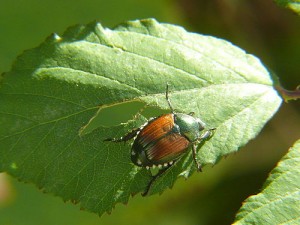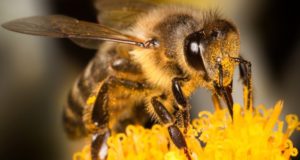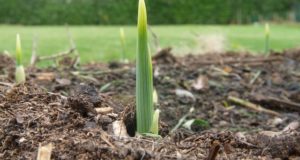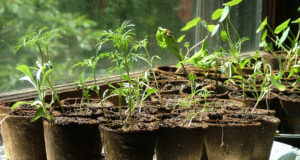Some things that all gardeners face are insects and weeds in our vegetable patches. Growing our bounty without using chemicals can prove a bit overwhelming for the organic gardener, especially the novice. This article will give valuable info on what can be used to fight the pests while preserving the organic garden from chemical overload.
 Companion Gardening
Companion Gardening
Your first line of defense in the fight against in insects is companion gardening. Companion gardening is the pairing two or more plants together that will benefit each other with repelling insects, better growth, and higher yields. One commonly know companion plant is marigold, but there are many more out there, depending on what you are growing in your garden.
Beneficial Insects
There are many insect pests that would like to eat your garden before you
are ready to harvest it. Conventional pesticides will not only kill the “bad bugs” but will destroy the “good bug” population, too. Aphids, cutworms, and mealybugs are just a few of the bad bugs that you will have to deal with in your garden. If you are determined to make a go of organic gardening, you will want to look into adding ben
eficial insects to your garden to fight off its natural enemies. When you have found the right combination of natural predators for your garden pests and maintain the right environment to entice them to stay, you are well on your way to saving time and money controlling the pests in your garden.
Types of beneficial insects
- Miniwasps – lay their eggs in the eggs of many moths and butterflies. When the wasp eggs hatch, they feed on the eggs and larvae of the moths and butterflies.
- Nematodes – carnivorous fungi that will kill and eat cutw orms. Some varieties may be become enemies of your garden; growing marigolds among your garden can control them.
- Ladybugs – will eat aphids, scales, and mites.
- Hover fly larvae – feed on aphids and caterpillar larvae and eggs.
- Praying Mantis – feeds on insects.
- Predatory mites – feed on harmful mites.
Homemade Sprays
Most garden pests and other bugs are drawn to your plants by their fragrance. If you make a spray that doesn’t smell or taste good and is hot and spicy, it will work as a natural deterrent to these creatures.
Pest Turn-offs
Many have found that garlic is an odorous, toxic repellant to garden pests. Planting edible garlic between the rows of your vegetables and between your roses will repel aphids and other insects. Rosemary, chives, sage, basil, and tobacco are also smelly insect repellants.
There are a number of recipes for natural sprays to control your garden pests. Other sprays can be made of mineral or vegetable oils, onions, and hot peppers; even your kitchen dish soap can be used as a popular, natural insecticide.
Plant Extracts
There have been some commercial sprays that have been made from the extracts of chrysanthemums, called pyrethrins. There have also been solutions of insecticidal soaps made available in garden shops and home improvement centers. In recent years SC Johnson, Ortho, and other companies have made these kind natural products easily available to us through many retail outlets. You may even find them at your local Wal-Mart or Home Depot stores.
Make Your Own Insecticide
Pepper Spray – great for ants and other small pests
- 3 cups boiling water
- 1 cup chopped hot peppers
Mix together and let stand 15 to 30 minutes. Strain with mesh strainer to remove the peppers and put into a spray bottle. Spray around plants, being careful not to spray directly on the foliage.
Minty Soap Spray – spray right on the ants
- 1 tablespoon Dr. Bronner’s mint soap
- ½ gallon water
Mix together in sprayer. Use freely on ants.
Garlic Spray – general insecticide
- ¼ cup chopped garlic
- 3 cups water
- 2 tablespoons mineral oil
- 1 – 2 tablespoons dish soap
Soak the garlic in the mineral oil and let sit overnight. Mix the water and dish soap into the garlic mixture. Strain and store in a glass container away from light. Put into sprayer and spray on garden plants. Must be eaten to be effective on your pests.
Nicotine Spray – use on scale and mealy bugs
- 30 cigarette butts, minus the filters
- 1 gallon water
Soak the butts in the water for a week or more. Strain and pour into spray bottles. Spray on scale and mealy bugs.
Red Pepper, Garlic, and Onion Spray – general pesticide and caterpillar spray
- 1 clove garlic, chopped
- 1 large onion, unpeeled, chopped
- 1 tablespoon red pepper
- 1 ½ quarts water
Mix all ingredients in large pan, place on stove, and bring to a boil. Simmer 20 minutes. Cool mixture, pour into a jar, seal and let stand six weeks. To use mix 1 tablespoon of this mixture with a pint of water and a tablespoon of dish soap. Pour into sprayer and spray on plants and caterpillars.
NOTE: Do not allow this to come in contact with skin or eyes.
Good luck, and happy organic gardening!
©2011 Off the Grid News
 Off The Grid News Better Ideas For Off The Grid Living
Off The Grid News Better Ideas For Off The Grid Living

 Companion Gardening
Companion Gardening


